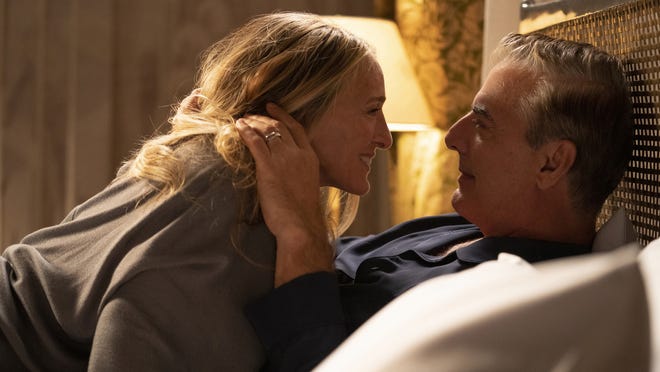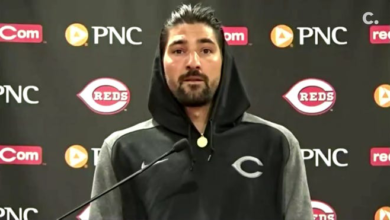
Chris Noth, who played Mr. Big on "Sex and the City" and recently reprised his role for the franchise's latest reboot, was accused last week of sexually assaulting three women between 2004 and 2010. Afterward, a familiar social-media script played out.
Some of the public expressed horror and shock, despite reports in the 1990s that model Beverly Johnson, a woman of color, had come forward to accuse Noth of domestic violence. Some defended the actor, who called the allegations "categorically false," and questioned the timing of the disclosures, though survivors often take years to process abuse and can be triggered by the renewed visibility of their accuser. (This was also true of those who came forward to accuse Brett Kavanaugh, Bill Cosby, Donald Trump and Joe Biden.)
And almost everyone seemed to expect Noth's female co-stars – Sarah Jessica Parker, Cynthia Nixon and Kristin Davis – to weigh in. On Monday night, four days after the first report, Parker, Nixon and Davis released a joint statement.
"We are deeply saddened to hear the allegations against Chris Noth," it read. "We support the women who have come forward and shared their painful experiences. We know it must be a very difficult thing to do and we commend them for it."
Why didn't you report? Shame, shame, shame

It's what people were waiting for, and while some sexual violence experts felt the statement appropriate and even commendable, some on social media said it didn't go far enough. Demand for the response and public reaction to it reflects the impossibility of women's position in a culture of rampant sexual violence. Women are more likely than men to be sexually abused, but they are also expected to speak out against that violence in ways men are not.
"It distracts from what the real story should be here, which is not about what Sarah Jessica Parker thinks," says Nicole Bedera, a sociologist who studies how colleges cover up sexual violence. "This is the way the patriarchy is manifesting, making it so that no matter what men do, it's women who are the ones burdened by their actions, whether the burden is sexual trauma or having to cover up for what they've done or take the heat for what they've done. We put the burdens of sexual violence on women in every case."
Sexual violence experts say it's reasonable to expect Noth's female co-stars to acknowledge the seriousness of the accusations against him. But that expectation ought to be fairly applied. If Noth had three male co-stars, they said, it's unlikely there would have been intense scrutiny around their responses.
"The perception is that women are responsible for protecting other women. ... We do expect them to take more responsibility and ownership for the actions of others," says Laura Palumbo, communications director at the National Sexual Violence Resource Center. "But we don't expect men to empathize with all of the painful experiences of women. Whenever men are vocal and stand up in a positive way, it seems like they're going above and beyond."
Analysis:The men who kept Harvey Weinstein's secrets safe are all around us
Accountability for abuse rarely 'black and white'
Palumbo welcomed the three stars' joint statement. She says what she hears more often are people immediately dismissing allegations based on their experience or knowledge of an individual, claiming they're "shocked" or saying that "having worked with this person, I don't believe it."
Lena Dunham in 2017 defended "Girls" writer Murray Miller after he was accused of sexual assault, suggesting that because she had "worked closely with him for more than half a decade" she was "confident that sadly this accusation is one of the 3% of assault cases that are misreported every year." Dunham later publicly apologized to the accuser and called her defense of Miller "a terrible mistake."
"It is really great to see how, even those who have those connections to Noth are acknowledging the impact on the victims and showing confidence in the stories of the survivors who've come forward," Palumbo says. "It's important to keep in mind that people who perpetrate abuse are often skilled in how they present themselves and how they use their power and position to try and avoid scrutiny."
Palumbo says while it's reasonable to think about how the women who helped contribute to the success of Noth's career could have taken action to hold him accountable or to prevent him from harming, accountability is rarely "black and white" and remains countercultural, particularly in an industry where sexual abuse is normalized and often excused.
'An impossible situation'
During the 2020 presidential election, Stacey Abrams, a national name in the Democratic Party and a current Georgia gubernatorial candidate, was asked to respond to sexual assault allegations against then-presidential candidate Joe Biden. Abrams said "women deserve to be heard," but also that "I believe Joe Biden."
Analysis:In first presidential election post-Me Too, survivors of sexual violence largely invisible
Bedera says some survivors saw Abrams' response as not going far enough. Others empathized with the double bind she was in.
"It's an impossible situation," Bedera says. "If she had taken the allegations against Biden as seriously as we would've hoped, what would she have been asked to give up? Would she still have the same kind of political success that she has now? And I'm not just talking on a career level, I'm talking from the perspective of someone who's trying to make sure that people of color have fair access to the vote."
When political, economic and social power still largely resides with men, experts say women who desire power and platforms often find they can't acquire their own without aligning with men whose behavior they do not privately condone, but which they are reluctant to publicly condemn.
Palumbo says as more survivors continue to come forward, she's hopeful the public will increasingly demand that men have an opinion about sexual violence, too.
"We've been in this ever-evolving social reckoning," she says, "and we're coming to terms with the fact that sexual harassment, assault and abuse are as pervasive as the statistics have always told us that they are."
If you are a survivor of sexual assault, RAINN offers support through the National Sexual Assault Hotline (800.656.HOPE and online.rainn.org).









